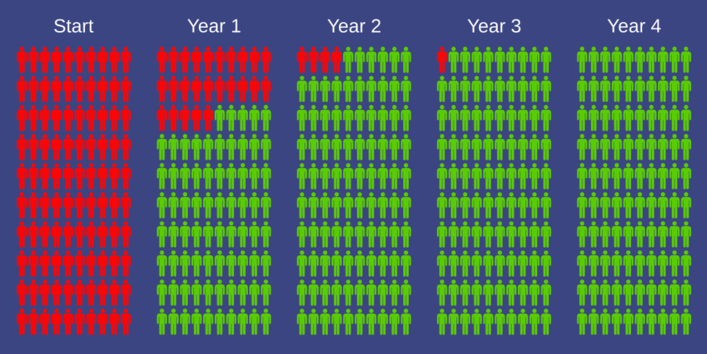Beware the Serpent
- Reckless investment follows the principle of Adam and Eve, who, being human, succumbed to the temptation that was “biting the apple”.
- Done correctly, long-term investing will seamlessly align the most cherished of lifetime goals with a goal-driven investment portfolio; a portfolio which always remains the servant of the plan. Harmony reigns.
- But, being human (we all are!), and having watched equity prices rise over the past decade, we begin to allow the financial press, the serpents of the markets, to allow us to think we can beat this thing.
- We forget that we no longer have to be disciplined to the tried and tested methods of asset allocation and diversification. Oh no. We’re smarter than that. We think we can see where the action is. We can outperform.
- When we bite into the “apple” that is out-performance, and when the focus of our portfolio shifts away from our financial goals and onto the market itself, we commit the original investment “sin”.
- For we have succumbed to the serpent, the serpent that we call “Alpha”, the illusion of consistently superior selection and timing. And the serpent has come into our garden to destroy us and it will.
- Out-performance is neither a financial goal nor a financial plan. The quest for out-performance is very often an attempt on the investor’s part to avoid the pain of planning.
- Planning which is to set goals; to figure out what those goals will cost; and to make the commitment to save enough to fund those goals.
- We live by the motto that the ‘less you look, the better it will perform.’ Think about it.
The ratings agency Standard and Poors has performed a tracking exercise with their Persistence Scorecard. They look at US equity mutual funds which have beaten their peers over five successive 12 month periods and track this elite group over time.
Above is a visual representation of their report, which shows how many of the elite top 25% performing funds remain in the top 25% over successive years. If their outperformance was due to skill, then you would expect the top performers to remain top performing for several years. If their outperformance was due to luck, then you would quickly see performance fall back to the average over time.
The number of persistently outperforming funds falls rapidly to 26% in the first year, 4% in the second, 0.5% in the third and 0.3% after 4 years.
The stock market is the one place you get rewarded for doing nothing. Stop chasing Alpha. Focus on the plan.
THE VALUE OF INVESTMENTS AND THE INCOME FROM THEM MAY GO DOWN. YOU MAY NOT GET BACK THE ORIGINAL AMOUNT INVESTED.





